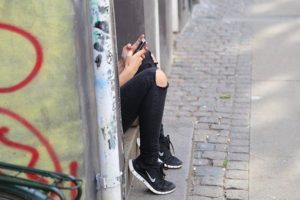Listening to voices at the margins: be careful what you wish for
24 february 2020
by simon edwards
Senior Lecturer (Youth Studies), University of Portsmouth
Twitter: @dr_edw4rds
overview
Participatory involvement by students in learning and development processes seems to be gaining traction in UK schools. The emphasis being on buzz phrases such as ‘student-led’ and ‘student voice’.
This emphasis extended to a recent action research project called Beyond the School Gates (BSG) funded by the Sussex Learning Network, a National Collaborative Outreach Programme (NCOP) partnership in Sussex. Five former excluded students were trained as researchers to draw on their lived experiences to explore the experiences of exclusion for current students and their parents.
Although leading to a transformative mentoring project, these students’ and their parents’ perspectives of exclusion were not readily embraced by their associated schools and alternative provisions. What, therefore, do ‘student-led’ and ‘student voice’ actually mean? And how do we manage this as education professionals when the findings are not as positive as we might have hoped?
It is easy in this situation to blame institutional attitudes and make this the excuse not to develop and adapt our own research methods. Yet, this blog argues some of the responsibility for ensuring a socially just model of research lies with us as researchers. We are engaging directly in work that supports the idea of social equity and perhaps therefore have a responsibility to ensure our practice is ‘fit-for-purpose’ and representative of the groups with whom we work.
the project
In March 2018, the BSG project coincided with a call for research by the Department for Education in England (DfE) that welcomed research that voiced students’ and their parents’ experiences of school exclusion. Their participation in the research processes was particularly welcomed by the DfE, which reflected wider calls for research that enabled student voice to make meaningful changes to organisations they attend (see Livingstone and Third 2015).
Drawing on the Husserlian view that lived experience is a valid form of evidence, three of the lead researcher’s former excluded students and their parents were trained in Freire’s (1972) decoding methods to design, gather and analyse data from interviews with five recently excluded secondary school students and their parents.
Data findings stood juxtaposed to political discourses that view exclusion as being influenced by poor parenting or student deviance though. Here, political discourse, is understood as values and beliefs central to conversations that underpin English political debates and, in turn, policy. In relation to education policy these values and beliefs were evident in David Cameron’s 2016 speech that viewed and responded to issues related to life chances through a deficit and reductionist lens. This understood educational failure as influenced by poverty and subsequent lack of parenting skills that extended to students’ perceived moral or developmental deficit i.e. needing to develop character, resilience and a value of hard work and determination. Conversely, our findings illustrated a spiral of disillusionment, educational disengagement and fractured relationships between students, parents and teachers that emerged as the participants encountered a series of life events that coincided with the educational processes in schools.

intervention
A subsequent intervention was devised by the researchers in collaboration with these participants that saw the researchers become mentors. Mentors both enabled them to develop skills to access resources that met their educational and developmental needs, and also acted as conduits between students, parents and schools to facilitate student voice in order to make changes to schools’ practices and interventions. These processes would address some of the effects of this spiral. Drawing on Freire (1972; 2005) mentors focused on creating dialogic and relational spaces between parents and students (sometimes these conversations were separate from each other). Here, the term ‘dialogic’ involved creating time and space for conversations where students and their parents could discuss with mentors and / or each other their experiences of exclusion, understanding of a good life and what resources they needed in order to achieve this. The aim here was to always support family relationships that allowed the student to develop their interdependence with peers but also with parents. In this way the student voice was central to the process but not isolated from their wider, significant relationships. Activities such as family cake making and mending a bicycle puncture with a student sometimes facilitated this process.
A report was published in September 2018 that explained the process of the research and mentoring intervention and showed that six of the ten excluded students had made significant and recognised (by education institutions) progress to re-engage in their education. In particular, students’ attitudes towards learning changed. For example, one student who had not been to school for eight years now attended an alternative provision for 2-3 days per week. Another student made significant adaptations to his behaviour and his attendance increased significantly at an alternative provision. Parents and students expressed high levels of satisfaction with the mentoring support.
concerns & barriers
On publication of this pilot-stage report, interest in the mentoring intervention grew and subsequently led to referrals being made from an education provider. Yet, we also experienced scepticism and concern when we presented the findings or attempted to collaborate to facilitate change with some education providers though, which extended to the provider who made the referrals after the second report was published in September 2019. These concerns were mirrored at conference presentations and respondents to an interview by an educational newspaper despite the success of the project.
Key concerns raised were:
- Parents seen as manipulating the researchers to play the system and get what they want
- Students lying about their actions that led to exclusion
- Data from interviews being one sided and not taking into account the perspectives of the excluding institutions
- Resistance to involving parents or excluded students in the processes of change until they had adapted to desired behaviours – deficit placed on parenting ability or student morality
- Publication of findings raised fears of public criticism or questions raised by external funders
BSG has given me more confidence and independence. Before BSG I used to rely on other people to help me with problems. Now I try to work things out more by myself and rely on people less. The project really listens and take in anything your say…they make sure that you don’t get excluded again by working with you to achieve that
learning curves
Although the initial research stage of Beyond the School Gates was not student-led in terms of participant action research, their voice was central to the findings and the subsequent development of the mentoring project that emerged from these findings. Indeed, the development and delivery of the mentoring project was also very much student-led, as Neil touches on above. Perhaps though, this was the issue – that we had assumed the evidence in the form of research data and the mentoring project discussions would be automatically acted on and that ‘student led’ and ‘student voice’ were little more than buzz words in a research path that is claimed to be increasingly fruitful to follow. Perhaps we had not really moved on from Mansfield, Welton and Halx’s (2012, 21) claim that ‘(w)hile much research has explored leading schools for social justice, it has rarely considered the student perspective as an integral component of leadership decision-making.’

However, it is easy to become cynical and blame and problematise institutional attitudes and systemic issues and consequently make this the excuse not to develop and adapt our own research methods. Particularly when some of the responsibility for ensuring a socially just model of research lies with us, the researchers. Taking Friere’s model into consideration that asserts the student / educator relationship is reciprocal (ie that the educator learns from the students and vice-versa on a mutual journey of discovery) we must become what I call researching educators. Here, educator means being more than teacher and researcher means more that data gathering. Here, if ‘teacher’ implies a responsibility to enable students’ social and cognitive development the term ‘educator’ implies a responsibility to develop contexts that promote social justice as a collaborative project. The researching educator explores and develops methodologies that facilitate this process of mutual education. We therefore have no option but to pursue this path. Moreover, this extends to outreach practitioners who may not see themselves as ‘researchers’. We are all, as researching educators, engaging directly in work that supports the idea of social equity and justice. It is therefore our responsibility to ensure our practice is ‘fit-for-purpose’ and representative of the groups with whom they work.
call to action
Addressing such social inequalities therefore may well lie in promoting and developing approaches that, as researching educators, promotes the participation of all stakeholders from the start of a project. This would mean that ‘student-led’ and ‘student voice’ is understood to mean more than gathering data or enabling them to have a say in the development of research. A model that currently limits their participation to processes that end before making meaningful change. Perhaps, therefore, our role as researching educators is to develop knowledge exchange frameworks that train organisations in the processes of organisational change and transformative research. A model that involves addressing their mind sets from the moment they invite us to carry out research.
bibliography
Brown C. (2013) Making evidence matter: a new perspective on evidence-informed policy making in education. London, IOE Press.
Cameron, D. 2016. Prime minister’s speech on life chances. Available online at: https://www.gov.uk/government/speeches/prime-ministers-speech-on-life-chances (accessed 21 December 2018).
Freire, P. (1972). Pedagogy of the Oppressed. Penguin Classics.
Freire, P. (2005). Education for Critical Consciousness. London and New York: Continuum.
Husserl, E. (2012 translated from original). General Introduction to Pure Phonomenology. Routledge Classics.
Livingstone, S., and Third, A. (2015) Children’s and Young People’s Rights in the Digital Age. Call for papers. New Media & Society. Available online at http://bit.ly/2HRaBcU (accessed 20 September 2015).
Mansfield, K., Welton, A., and Halx, M. (2012), Chapter 2 Listening to Student Voice: Toward a More Inclusive Theory for Research and Practice, in Christa Boske, Sarah Diem (ed.) Global Leadership for Social Justice: Taking it from the Field to Practice (Advances in Educational Administration, Volume 14) , 21 – 41. Emerald Group Publishing Limited.
Nutley, S.M., Walter, I. and Davies, H.T.O. (2007) .Using evidence: How research can inform public services. Bristol, The Policy Press.